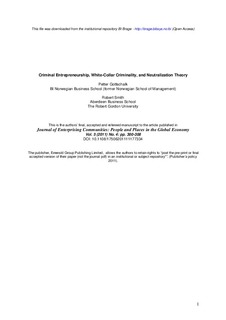| dc.contributor.author | Gottschalk, Petter | |
| dc.contributor.author | Smith, Robert | |
| dc.date.accessioned | 2012-01-05T10:30:40Z | |
| dc.date.available | 2012-01-05T10:30:40Z | |
| dc.date.issued | 2011 | |
| dc.identifier.issn | 1750-6204 | |
| dc.identifier.uri | http://hdl.handle.net/11250/93394 | |
| dc.description | This is the authors' final and acceptet version, post refereeing, of the article. Publisher's version is available at www.emeraldinsight.com/1750-6204.htm | no_NO |
| dc.description.abstract | A legal entrepreneur is a person who operates a new enterprise or venture and assumes some accountability for the inherent risk. Similarly, the criminal entrepreneur's task is to discover and exploit opportunities, defined most simply as situations in which there are a profit to be made in criminal activity. Examples of criminal entrepreneurship committed by otherwise legal entrepreneurs are commonly labeled as white-collar criminality. This paper discusses how criminal entrepreneurship by white-collar criminals can be explained by neutralization theory as white-collar criminals tend to apply techniques of neutralization used by offenders to deny the criminality of their actions. | no_NO |
| dc.language.iso | eng | no_NO |
| dc.publisher | Emerald Group Publishing | no_NO |
| dc.subject | Criminal entrepreneur | no_NO |
| dc.subject | white-collar crime | no_NO |
| dc.subject | neutralization theory | no_NO |
| dc.title | Criminal Entrepreneurship, White-Collar Criminality, and Neutralization Theory | no_NO |
| dc.type | Journal article | no_NO |
| dc.type | Peer reviewed | no_NO |
| dc.source.pagenumber | 300-308 | no_NO |
| dc.source.volume | 5 | no_NO |
| dc.source.journal | Journal of Enterprising Communities: People and Places in the Global Economy | no_NO |
| dc.source.issue | 4 | no_NO |
| dc.identifier.doi | http://dx.doi.org/10.1108/17506201111177334 | |
